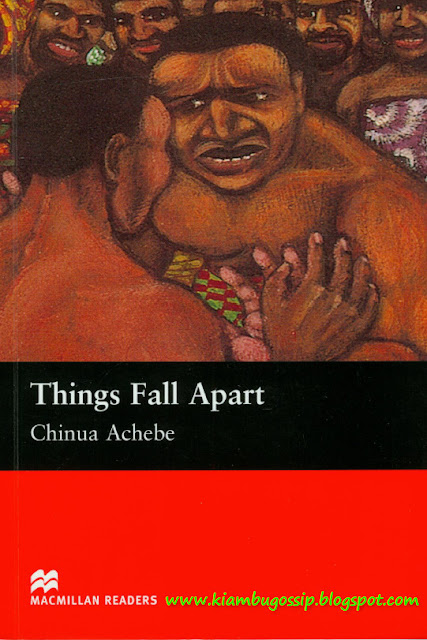SOCIAL MEDIA FINALLY DELIVERS THE KILLING BLOW TO CHINUA ACHEBE
 |
| CHINUA ACHEBE'S MOST CELEBRATED BOOK |
Eventually, Umuofia's elders consult with the oracle whom declares that Ikemefuna must die. Ikemefuna is led off outside the village and is struck with a machete. He speaks his last words, saying "Father, they have killed me!" prompting Okonkwo to deliver the killing blow.
Below are some of the favourite quotes from ''Things Fall Apart''
“There is no story that is not true, [...] The world has no end, and what is good among one people is an abomination with others.”
“The white man is very clever. He came quietly and peaceably with his religion. We were amused at his foolishness and allowed him to stay. Now he has won our brothers, and our clan can no longer act like one. He has put a knife on the things that held us together and we have fallen apart.”
“Perhaps down in his heart Okonkwo was not a cruel man. But his whole life was dominated by fear, the fear of failure and of weakness.
It was deeper and more intimate that the fear of evil and capricious gods and of magic, the fear of the forest, and of the forces of nature, malevolent, red in tooth and claw. Okonkwo’s fear was greater than these. It was not external but lay deep within himself
“Do not despair. I know you will not despair. You have a manly and a proud heart. A proud heart can survive a general failure because such a failure does not prick its pride. It is more difficult and more bitter when a man fails alone.”
“A man who calls his kinsmen to a feast does not do so to save them from starving. They all have food in their own homes. When we gather together in the moonlit village ground it is not because of the moon. Every man can see it in his own compound. We come together because it is good for kinsmen to do so.”
“Mr. Brown had thought of nothing but numbers. He should have known that the kingdom of God did not depend on large crowds. Our Lord Himself stressed the importance of fewness. Narrow is the way and few the number. To fill the Lord's holy temple with an idolatrous crowd clamoring for signs was a folly of everlasting consequence. Our Lord used the whip only once in His life - to drive the crowd away from His church.”
“Unoka went into an inner room and soon returned with a small wooden disc containing a kola nut, some alligator pepper and a lump of white chalk. "I have kola," he announced when he sat down, and passed the disc over to his guest. "Thank you. He who brings kola brings life. But I think you ought to break it," replied Okoye passing back the disc. "No, it is for you, I think," and they argued like this for a few moments before Unoka accepted the honor of breaking the kola. Okoye, meanwhile, took the lump of chalk, drew some lines on the floor, and then painted his big toe.”
“If I hold her hand she says, ‘Don’t touch!’
If I hold her foot she says ‘Don’t touch!’
But when I hold her waist-beads she pretends not to know.”
“When the moon is shining the cripple becomes hungry for a walk”
“Among the Igbo the art of conversation is regarded very highly, and proverbs are the palm-oil with which words are eaten.”
“Age was respected among his people, but achievement was revered. As the elders said, if a child washed his hands he could eat with kings.”
“The world is large,” said Okonkwo. “I have even heard that in some tribes a man’s children belong to his wife and her family.”“That cannot be,” said Machi. “You might as well say that the woman lies on top of the man when they are making the babies.”
“Ogbuef Ezedudu,who was the oldest man in the village, was telling two other men when they came to visit him that the punishment for breaking the Peace of Ani had become very mild in their clan. "It has not always been so," he said. "My father told me that he had been told that in the past a man who broke the peace was dragged on the ground through the village until he died. but after a while this custom was stopped because it spoiled the peace which it was meant to preserve.”
“Then listen to me,' he said and cleared his throat. 'It's true that a child belongs to its father. But when a father beats his child, it seeks sympathy in its mother's hut. A man belongs to his fatherland when things are good and life is sweet. But when there is sorrow and bitterness he finds refuge in his motherland. Your mother is there to protect you. She is buried there. And that is why we say that mother is supreme. Is it right that you, Okonkwo, should bring your mother a heavy face and refuse to be comforted? Be careful or you may displease the dead. Your duty is to comfort your wives and children and take them back to your fatherland after seven years. But if you allow sorrow to weigh you down and kill you, they will all die in exile.”
“At the most one could say that his chi or ... personal god was good. But the Ibo people have a proverb that when a man says yes his chi says yes also. Okonkwo said yes very strongly; so his chi agreed. ”
MAY THE LEGEND LIVE ON

Comments
Post a Comment